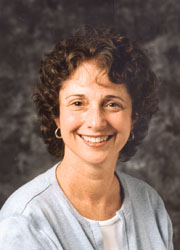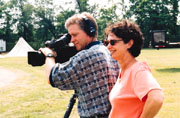Bringing Real Life
To the Screen
By Wendi Winters
When independent filmmaker
and three-time Emmy Award winner Patti Obrow White moved into
the house with a view of Aberdeen Creek in 1988, Annapolis rolled
out the welcome mat. Three years later, the mat was retracted
a bit when a searing documentary exposing a dark side of the teen
years, which she conceived, directed and produced, aired nationwide.
 White's
film spotlighted a lifestyle of despair among many Annapolis teens.
While lauding the efforts of parents and officials who intervened
in the children's lives, it harshly profiled parents who helplessly
stood by or, worse, encouraged their children's downward spiral
into crime, violence and addiction. The documentary, America
At Risk: Seeds of Hope, produced for the Turner/Tribune Companies
in 1992, galvanized Annapolis residents---and parents across the
country---to rectify the plight of "lost" teens. White's
film spotlighted a lifestyle of despair among many Annapolis teens.
While lauding the efforts of parents and officials who intervened
in the children's lives, it harshly profiled parents who helplessly
stood by or, worse, encouraged their children's downward spiral
into crime, violence and addiction. The documentary, America
At Risk: Seeds of Hope, produced for the Turner/Tribune Companies
in 1992, galvanized Annapolis residents---and parents across the
country---to rectify the plight of "lost" teens.
That was precisely the reaction for which White had hoped. "National
Geographic had just done a piece about Annapolis, calling it 'The
Jewel of the Chesapeake.' But we were forgetting about our kids
in the early '90s," she says. "My own two boys were then in grade
school. I was wondering about their future and what to do about
the kids who were already teens. Seeds of Hope took a
very honest look at the young people of this community---but it
could have been any town in Middle America. I went out on the
streets and found five kids whose story I told. I don't do things
in sound bites," she states. "Kids talk to me because I say 'Your
voice is important.'"
The film served as a catalyst. People understood the troubling
information the kids were trying to tell them about drugs and
feelings of abandonment. She pleads, "Is there a way to redirect
our younger kids so they don't take this road? I'm trying to do
this with my work."
This past spring, the Filmsters Production Company, comprised
of White and her partners, K. Lee Anderson of Annapolis, and Michael
I. Miller and David Dizenfeld of Los Angeles, presented their
first feature-length documentary, If I Could, to an audience
of 700 at Maryland Hall. The film was galvanic, the impetus for
bringing the community together on the issue of violence prevention.
It moved the audience and the event's sponsors, including Volvo
and Bob DeStefano of Sturbridge Homes---more than $70,000 was
raised from the event. The profits went to the YWCA Violence Prevention
programs, and a portion went to provide one scholarship for a
local kid to attend the VisionQuest program through the Worrell
Association.
 The
genesis of If I Could occurred more than 20 years ago.
White had worked her way through various grunt jobs at the CBS
News division in New York. She'd eschewed the traditional route
and did not become an on-air personality by choice deciding, instead,
to become a storyteller. She began making film documentaries with
a human side. "I produced a story
for CBS about a wagon train called VisionQuest that provided an
alternative to locking kids up. I lived with the wagon train,
off and on, for four or five months. On the train was a 14-year-old
girl from Denver named Tracy who was very verbal, very angry and
very attractive. She'd lived on the streets and had been involved
in drugs and prostitution. The
genesis of If I Could occurred more than 20 years ago.
White had worked her way through various grunt jobs at the CBS
News division in New York. She'd eschewed the traditional route
and did not become an on-air personality by choice deciding, instead,
to become a storyteller. She began making film documentaries with
a human side. "I produced a story
for CBS about a wagon train called VisionQuest that provided an
alternative to locking kids up. I lived with the wagon train,
off and on, for four or five months. On the train was a 14-year-old
girl from Denver named Tracy who was very verbal, very angry and
very attractive. She'd lived on the streets and had been involved
in drugs and prostitution.
"Twenty years later, Tracy reappeared. I'd kept in touch, but
hadn't talked to her in nearly 11 years. She called Bob Burton,
the head of the VisionQuest program---she considers him her surrogate
dad---to tell him she had a big problem. She's now a single mother
with four kids. Her 12-year-old son James was in serious trouble---she'd
discovered he had a loaded gun. For over half his life, he'd been
raging, locked away in various mental institutions, often in shackles
or rubber rooms. He was in danger of being sent to jail. The family
needed help."
White decided to follow the next generation's journey through
the VisionQuest program. This time, she didn't have the financial
backing of a network, though CBS graciously sold her the licenses
for the archival film and outtakes from the original story. Usually,
Filmsters, like most production companies, spends months preparing
for a project. Concepts are developed and approved, crews are
hired, Hollywood lunch appointments are made to woo the big money
people, and deals are struck to determine which network or cable
outlet will provide a "venue"---obtaining the rights to air the
documentary in exchange for upfront production monies.
If the company had waited, the train would have left without them
and valuable opportunities would have evaporated. Lady Luck arrived
in the guise of an anonymous Big Star who provided funding to
keep the film crew on the road until corporate sponsors were found.
White is especially grateful for AT&T's unwavering belief in the
film---its sponsorship enabled Filmsters to complete the project.
As of this writing, Filmsters is in discussions to place the film
before a national audience, coupled with a complete outreach program
nationwide.
What followed was more than two years of raw, harrowing, often
heart-breaking filming as the family jolted from one disaster
and horrifying revelation to another. If I Could, narrated
by two-time Oscar-winning actress Sally Field, juxtaposes the
20-year-old CBS footage with current events presenting, as Yogi
Berra once remarked, "Déjà vu all over again." It created, according
to the production notes, "...a rare and unique intergenerational
look at certain issues through the eyes of one family" and their
"...attempt to escape the long-term effects of trauma after decades
of abuse, abandonment, drugs and rage."
The film has already earned Filmsters an armload of awards: The
CINE Golden Eagle, the Christopher Columbus Award, Third Runner-Up
at the Seattle Film Festival for Best Documentary, and it was
the Winner of the Best Documentary Award at the WINFemme Film
Festival, honoring women in cinema in L.A.
But Hollywood on the Severn? Can a filmmaker thrive so far from
Tinsel Town? White says yes. "It's always a struggle, but doable
and well worth it."
She grew up in Dover, Del., and earned a degree in journalism
and political science from Elmira College in upstate New York.
From there, it was on to NYC and CBS. In 1983, she moved to Los
Angeles. She continued to work for CBS as she expanded her credits
as an independent film producer. Her husband, Geoffrey, was a
partner in Hans Christian Yachts, based in L.A. When the Whites
relocated to Annapolis, renowned as the American sailing capital,
the company headquarters also moved. Later, Geoffrey established
a partnership with the Delran, N.J.-based Independence Cherubini
Yachts, building large trawlers.
Seated at her kitchen table, White runs her hands through her
curly salt and pepper hair as she reels off the names of the area
residents who worked alongside her on If I Could. K.
Lee Anderson, line producer, is a Filmster partner. David Ewing,
of Bayside Productions, edited the film and also served as a producer.
Dr. Andrea Karfgin acted as psychological consultant. Key School
graduate Eric Bannat was the production and editing assistant.
Baltimore native Baby Jane Dexter performed the title song.
Beyond this emotionally draining project, White's recent film
projects include two for the Turner Wild!Life Adventures series:
Survival of the Yellowstone Wolves and The Great Bison Chase.
White's house serves both as her family's home and Filmster offices.
Indeed the world's biggest collection of extra-large tennis shoes
is piled in one sunroom while a Rube Goldberg-esque racket-stringing
machine sulks unused in the den, which doubles as the company
screening room. Upstairs, White and Anderson spend most days at
their desks doing project research and development. Anderson jokes
that White should just glue her cell phone to her ear since she's
on it for hours at a time. Film editing is done in Eastport on
an AVID computer co-owned by White's and Ewing's companies, and
post-production work is completed at studios in Washington, D.C.
White feels "it's very important for us to help the community.
Five years ago, Lee Anderson and I followed superintendent of
Anne Arundel County Public Schools, Dr. Carol Parham, and Dr.
Marty Smith, Anne Arundel Community College president, around
with a camera. The YWCA asked us to produce a straightforward
music video. The video captured real women at work and at life.
The audience loved it. We've done other videos to help recruit
teachers in the state. When the call comes, we try to help when
we can. Filmsters also takes on other local film and video projects,
including commercial and corporate work."
Filmsters is also developing several "very interesting projects"---a
follow-up sequel to Seeds of Hope, feature films that
are not documentaries and, perhaps, a television show. Looking
back on her work with teens, White says, "I always want to give
a kid a chance. It has to be pretty bleak before I give up. They
dishonor and disrespect adults a lot---because they learn it from
us. We have to honor our children."
Back
|

